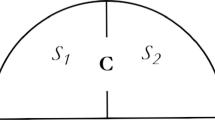Abstract
A generalisation of the maximum entropy (ME) approach to default reasoning [7,8] to cater for variable strength defaults is presented. The assumptions on which the original work was based are reviewed and revised. A new algorithm is presented that is shown to compute the ME-ranking under these more general conditions. The limitations of the revised approach are discussed and a test for the uniqueness of the ME-solution is given. The ME-solutions to several illustrative examples of default reasoning are given, and the approach is shown to handle them appropriately. The conclusion is that the ME-approach can be regarded as providing a benchmark theory of default reasoning against which default intuitions and other default systems may be assessed.
Similar content being viewed by others
References
E. Adams, The Logic of Conditionals (Reidel, Dordrecht, Netherlands, 1975).
R.A. Bourne and S. Parsons, Connecting lexicographic with maximum entropy entailment, in: Symbolic and Quantitative Approaches to Reasoning and Uncertainty, eds. A. Hunter and S. Parsons, Lecture Notes in Artificial Intelligence, Vol. 1638 (Springer, Berlin, 1999) pp. 80–91.
R.A. Bourne and S. Parsons, Maximum entropy and variable strength defaults, in: Proceedings of the Sixteenth International Joint Conference on Artificial Intelligence 1999) pp. 50–55.
T. Eiter and T. Lukasiewicz, Default reasoning from conditional knowledge bases: Complexity and tractable cases, Artificial Intelligence 124 (2000) 169–241.
D. Flanagan, Java in a Nutshell (O'Reilly, Sebastopol, CA, 1997).
H. Geffner, Default Reasoning: Causal and Conditional Theories (MIT Press, Cambridge, MA, 1992).
M. Goldszmidt, Qualitative probabilities: A normative framework for commonsense reasoning, Ph.D. Thesis, Technical Report R-190, Cognitive Systems Laboratory, UCLA, Los Angeles (1992).
M. Goldszmidt, P. Morris and J. Pearl, A maximum entropy approach to nonmonotonic reasoning, IEEE Transactions on Pattern Analysis and Machine Intelligence 15 (1993) 220–232.
M. Goldszmidt and J. Pearl, On the consistency of defeasible databases, Artificial Intelligence 52 (1991) 121–149.
S. Kraus, D. Lehmann and M. Magidor, Nonmonotonic reasoning, preferential models and cumulative logics, Artificial Intelligence 44 (1990) 167–207.
D. Lehmann, Another perspective on default reasoning, Annals of Mathematics and Artificial Intelligence 15 (1995) 61–82.
D. Lehmann and M. Magidor, What does a conditional knowledge base entail? Artificial Intelligence 55 (1992) 1–60.
D. Makinson and K. Schlechta, Floating conclusions and zombie paths: two deep difficulties in the “directly skeptical” approach to defeasible inheritance nets, Artificial Intelligence 48 (1991) 199–209.
E. Neufeld, Notes on “A clash of intuitions”, Artificial Intelligence 48 1991) 225–240.
J. Paris and A. Vencovská, A note on the inevitability of maximum entropy, International Journal of Approximate Reasoning 4 (1990) 183–224.
J. Pearl, Probabilistic semantics for nonmonotonic reasoning: a survey, in: Knowledge Representation (1989) pp. 505–515.
J. Pearl, System Z: a natural ordering of defaults with tractable applications to default reasoning, in: Proceedings of the 3rd Conference on Theoretical Aspects of Reasoning about Knowledge (1990) pp. 121–135.
J.E. Shore and R.W. Johnson, Axiomatic derivation of the principle of maximum entropy and the principle of minimum cross-entropy, IEEE Transactions on Information Theory 26 (1980) 26–37.
W. Spohn, A general non-probabilistic theory of inductive reasoning, in: Uncertainty in Artificial Intelligence, Vol. 4 (1990) pp. 149–159.
D.S. Touretzky, J.F. Horty and R.H. Thomason, A clash of intuitions: the current state of nonmonotonic multiple inheritance systems, in: Proceedings of the International Joint Conference on Artificial Intelligence (1987) pp. 476–482.
Author information
Authors and Affiliations
Rights and permissions
About this article
Cite this article
Bourne, R.A., Parsons, S. Extending the Maximum Entropy Approach to Variable Strength Defaults. Annals of Mathematics and Artificial Intelligence 39, 123–146 (2003). https://doi.org/10.1023/A:1024480428872
Issue Date:
DOI: https://doi.org/10.1023/A:1024480428872




